Tribeca 2020: 12 HOUR SHIFT Interview With Writer/Director Brea Grant
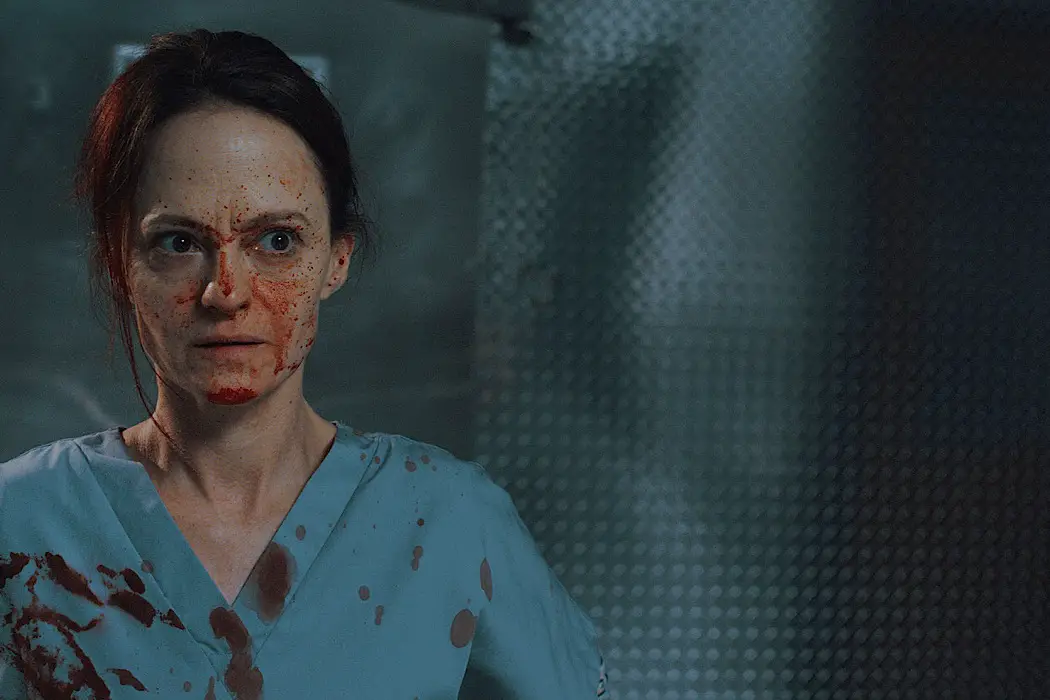
Kristy Strouse is the Owner/Editor in Chief of Film Inquiry,…
With everything going on in this world the Tribeca Film Festival, one of my favorite yearly events, wasn’t able to keep its original date. Like so many currently in the entertainment world, a lot of new and talented filmmakers didn’t get to showcase their work. Recently, Tribeca allowed some press to screen part of their slate online, and of course, Film Inquiry is covering as much as we can!
One film in particular that I was looking forward to was 12 Hour Shift. This is written and directed by actress Brea Grant, and it’s her second feature. It’s also a wickedly, hilariously, good time for its viewers, though… not so much for it’s characters.
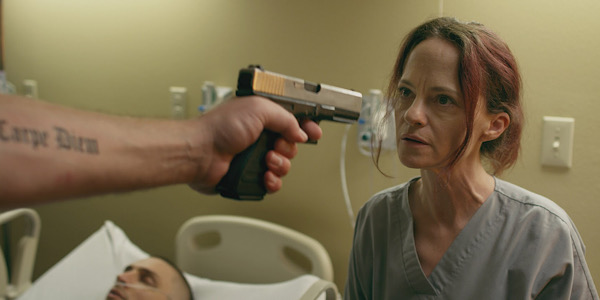
Angela Bettis plays Mandy, a nurse about to go on a double, twelve-hour long shift. Her frustration with the world weighs on her every movement and expression. She isn’t particularly likable, but none of these characters are. A bold move with a film, and luckily, it pays off as we watch a whirlwind of blood and chaos spin out within this Arkansas hospital. With a generous amount of the dark and weird, set with an amazingly strange and invasive (in the best possible way) score, I knew this was my kind of movie early on.
From the opening scene Mandy is disgruntled, indifferent – if not outwardly annoyed with most of the interactions she has. She’s a drug addict who is also part of an organ smuggling operation out of the hospital. Involved is co-worker, Karen (Nikea Gamby-Turner) and her cousin Regina (Chloe Farnworth) who is quite energetic about the task, but makes a grave error misplacing the most recent organ setting the night into a tailspin. What ensues is basically a cyclone around Mandy, keeping her as our wobbling sense of stability as things go haywire. Despite a lot of the characters being miserable, criminal or annoying, there’s still a measure of sympathy imbued, especially when it comes to Mandy.
Grant does a terrific job of melding together several perspectives into this melting pot of a disaster. The script and direction highlight her talent, and I can’t wait to see what she does next. Bettis shows us again how strong of an actress she is, adding biting commentary as tensions mount. Farnworth is also stellar and larger than life, continuously surprising us with her twisted choices. One of my favorite aspects of the movie was the visual unraveling paired with an amazing score. It truly sinks its claws into the growing emotions and stakes of the characters on screen, making the anxiety of the experiences even more visceral.
Grant creates a compelling locale for everything that could potentially go wrong in a 12 hour period. Especially when a drug addiction, a dangerous convict (David Arquette), an organ harvesting operation, and several big personalities, all collide. 12 Hour Shift is dark humor at its best, with plenty of violence and unexpected moments of levity to tie into a quirky, entertaining knot. It’s one worth letting itself unravel.
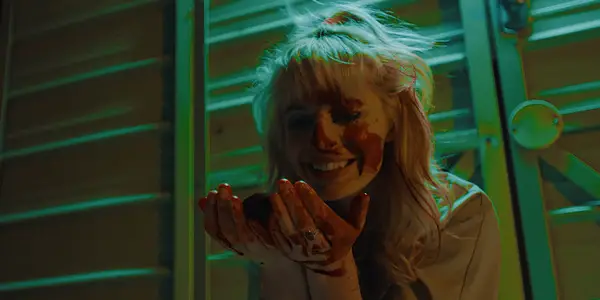
I was able to chat with Grant about the movie and we discussed her creative decisions, collaborations, and inspirations behind 12 Hour Shift.
Hello Brea! This is Kristy Strouse with Film Inquiry, thanks for chatting with me today! So, how have you been? How has everything been affecting you? Still finding ways to be creative?
Brea Grant: Ah, it’s been affecting me, but I’m still sort of going through my day to day routine. So, before all of this, I started every day by writing or doing a little workout and I’ve just kind of continued that, so I do pretty good about writing every day during this, until my computer broke, but it’s difficult for sure.
Yeah, I think routines help, for sure.
Brea Grant: That’s what I keep reading. [laughs]
So, congratulations on the film! I really enjoyed it.
Brea Grant: Thanks!
I know it’s a very strange experience because I know you wrote and directed this that’s at Tribeca, and you also wrote and starred in one for South by Southwest. I’m sure this has been especially stressful, given the circumstances, that you have these films aren’t able to get the same kind of viewing as they normally would with festivals.
Brea Grant: It’s a bummer for sure.
I’m sure it is, but I love that this was available online so we can get some coverage for it! So, can you tell us a bit about how the story came to you?
Brea Grant: Yeah, it was originally set in East Texas. I’m from East Texas, and it takes place in the ’90s and I am a child of the ’90s and I was sort of pulling on things from my teenage years, things that I was familiar with. When I was writing it, originally I was spending a lot of time in a hospital because of family issues, and I was just really inspired by what was happening around me as the nurses, what they had to go through every day and the complications. What they had to deal with, including me, so those things kind of combined in my head and I knew I wanted to write a story that played with these urban legends, particularly the girl who wakes up in the bathtub and her kidney is missing. Do you know that one?
I do!
Brea Grant: So, I wanted to take that and sort of put it in this different reality that I was familiar with and the reality in which I had heard all of these stories, because you hear about all these urban legends when you’re a teenager and that’s when you believe them and so it’s very autobiographical in some ways.
Yeah, and it’s definitely an interesting setting. I think it works because it is a place that could be quite chaotic. There’s a lot going on. In this film, despite Mandy being the main character, there are a lot of others around her with their own agendas. Lots of moving pieces!
Brea Grant: That was something we were all interested in from the beginning, we wanted everyone to wonder about these other characters. You know, like think…where was that guy this whole time, or like what is his story? You know about these various characters, so we could make sure that it felt really full like a real world. So that was important from the very beginning, to sort of flesh out these side characters. And I think the main thing I was focused on was making sure that Mandy felt like the grounded real character. We know we’re following her story and then we kind of go wild with these other characters and have a guy with a rat tail that goes down to his butt and no one will question it.
[laughs] Yeah, I love that. And you mentioned the 90’s (I love the 90’s). Was it important that it be close to Y2K, to give a little bit of like extra anxiety that you wanted to throw in?
Brea Grant: Yeah, I don’t know how old you are but Y2K was so weird and it was one of the first times I can remember feeling a part of a global issue, funny that I’m thinking about that now but at the time, I really believed, you know? And it turns out to have been a little bit of an urban legend as well. The world was going to shut down when Y2K happened, I thought all the computers were going to go out, everyone was going to have to live off the land. Because that was what people were saying… things were going to go crazy. And so it just felt right to set it during that time.
Oh I remember!
Brea Grant: It was a crazy time right?! Like it’s funny experiencing this now because this is kind of what we would experience except we thought we weren’t gonna have electricity (which I don’t know why we ever thought that would happen), but I remember being convinced that this was going to be like the end.
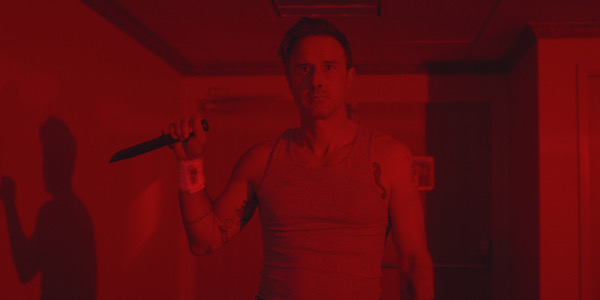
It was a very strange time, just like it is now- 20 years later. You mentioned you were originally going to set it in Texas, what made you change it to Arkansas?
Brea Grant: My producers are from Arkansas, and when they read the script they thought they could find a location in Arkansas and they did. They found this amazing hospital, we were able to take over a whole floor, which is a dream for an indie movie, and Arkansas also gave us great tax incentive. So, I love Texas, I’m very loyal to Texas. I still consider it home, but because of the access they had to the facilities, and the local things they could pull from, it just made more sense for us to shoot there and then we decided to set it there because all of the tax incentives and the things they were offering.
The whole cast is really amazing, but when did Angela first get involved?
Brea Grant: We were not in prep for very long, we basically went into prep and tried to find her first because we knew that that was going to be the most important character. I’ve been a fan of hers for a long time since May. I think that is like one of the most important indie movies that anyone can watch. But I also knew some of her other work and knew that she was really versatile.
And so we sent the script to her team, and the role was written for someone a little bit younger and they weren’t sure if it was quite right for her. So I went around them, which hopefully they never read any of these interviews where I say that, [laughs] and sent it to her friend who is a mutual friend. She got it to her and then Angela and my producer Tara and I met, and I essentially begged her to be in the movie. She said yes and then we were able to meet a couple more times just to talk about the character because I knew that if we didn’t nail her character then the rest of the movie was going to feel completely not balanced.
That’s awesome. She is perfect in it and I love May, terrific movie. The score in this film really stood out. That was Matt Glass who I believe is also the cinematographer correct?
Brea Grant: Yeah, and also a producer.
So many hats for him too! [laughs] So was there a collaboration at all with the score as far as something you were trying to invoke?
Brea Grant: Yeah. So Matt…they basically do everything in house at HCT. So from the beginning, Matt was on to do the cinematography, the VFX, and the score. We were both listening to the Us soundtrack quite a bit at the time and so we were a little influenced by that, but once the movie was edited we started coming up with ideas. He had this great idea that all of the characters sort of had their own little musical parts. And so, Mandy specifically at the very beginning is mostly drums, driving the whole thing. And for Chloe’s character, and we had a lot of trouble with that, we put in a bunch of different stuff in the temp score and eventually came up with the idea which was that Regina was always in her head. So, she was performing this Grand Opera all the time, you know? So, it was all these operatic singers when you meet her, and then those two scores sort of combined throughout the movie. I think it’s brilliant.
I agree! I love a lot of the narrative turns you take and some of the just randomness at times, like the musical in the middle, I love that part! So was that something that you were always planning on throwing in or what was the kind of creation of that?
Brea Grant: No, actually we were already shooting and we were about to shoot one of the scenes and we were also about to lose Tommy Hobson, who sings in the middle of the movie, he’s a part of the musical. I knew we had this chapel that we were only using a couple of times but it’s such a cool location and I wanted this big midpoint where we see our main character doing something really bad and we’d see Regina’s character doing something really bad… I wanted it to be a big moment.
I reached out to some ’90s bands to see if I could get some songs and we couldn’t afford any of them [laughs]. So, in Arkansas I kind of got inspired by being there and seeing the chapel and thinking about all these songs that I grew up within the church and there’s just a really creepy one and “Blood of the Lamb” is a creepy song. It has a lot of blood references and the scene is very bloody itself, so I just thought if we could just get Tommy Hobson and Tara Perry to sing, (they’re both singers) to create like a cool musical moment, then maybe it would work, and it’s my favorite part of the movie by far.
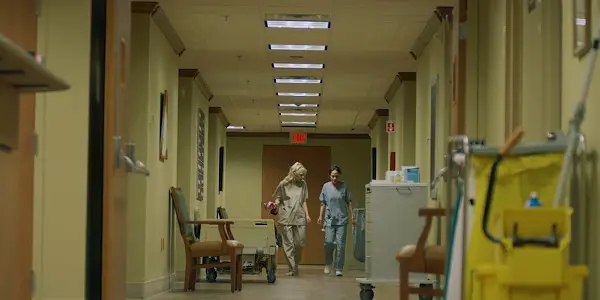
Yeah, it definitely works! So, you said that you were kind of inspired when you were doing it by some things in Arkansas, do you think that the story or the script change at all as production started or, like, more actors got involved like did you make changes to certain characters or anything like that?
Brea Grant: The musical was a big change. We ended up giving some characters that we liked a little bit more screentime, Tommy Hobson‘s character being a big example. He plays an EMT and he’s a friend and came out to work on it and so we ended up adding a few more moments with him because I thought he was so cool and interesting and he’s such a great actor. So, things like that I love, and then on the day I always want the actors to improvise and so we ended up adding a lot that way and coming up with some really funny stuff in the moment but other than that, no we didn’t add that much stuff to the script.
So when you say improvise as far as like some of the dialogue?
Brea Grant: Oh, absolutely. Yeah, I should say that we stuck to the script story wise but I love when actors improvise and Kit Williamson who plays the officer in the movie, he has a show called Eastsiders which I worked on for many years, and Kit always pushes actors to spend one take just improvising the lines and saying what they want and he calls it “The actors take.” I have started doing that in my own work, so at the end, once I’ve gotten everything I think I need then I say “Go do whatever you want” and we had some brilliant improvisers on that movie and they make me look so much funnier than I actually am because they come up with really funny lines.
That’s great, and the film is very funny! I’m sure you had plenty to do with it yourself. As an actor yourself is that something that you kind of pull from? And do you enjoy improvising yourself?
Brea Grant: You know, I love it. Whether the director likes it or not I usually come in with a few ideas I want to try. Especially at this point, it’s not as common to get to do in television, but in indie films, I feel like everyone gets to come in with their own ideas and a lot of indie directors are really open to hearing what the actors have to say because the actors are so much a part of the collaboration. I try to stay open to that kind of stuff as well.
As this is your second feature, with quite a gap from your first, how do you think you’ve changed as a director?
Brea Grant: Oh wow, I’ve learned a lot in that time. Just because that’s seven years of still being in the industry, and because I have also directed shorts and I’ve directed television. I’ve learned quite a bit about directing between, but Best Friends Forever was the first thing I ever directed, and I made a lot of mistakes, I still make a lot of mistakes, but I think I’m much more self-aware now and I have a lot more fun.
I think with your first feature you’re so worried you’re going to screw it up and no one will ever let you make another movie that you don’t want to take any huge risk and you spend so much time trying to get your way. On this one I felt far more open and far more interested in just having a good time and not worry constantly about the festival circuit and whether or not people will like the movie. I promised myself this time that I was just going to enjoy all of it, which is very funny because the festival circuit did not happen. [laughs] So, I don’t know… I didn’t get to enjoy it but I think I did the best I could.
I get it. But, no one could have predicted that so you can’t fault yourself there. Sounds like it was a fun experience making it though!
Brea Grant: Yes!
The fact that you have two movies with two huge festivals in such a short time is very impressive in itself. You should feel proud of that! Do you have any advice for others out there working on writing or directing?
Brea Grant: You should over-prepare, prepare for what could possibly happen, and then have a backup to that and then know all those plans are going to be thrown out the window. As long as you can do that you’ll be fine. Surround yourself with people who are going to support you in every situation, in every decision, but aren’t scared to add their own opinion and to make interesting choices. One thing I’m really grateful for is the score of the movie because Matt came in with some really interesting choices that I never would have thought of and I don’t write music, so find yourself someone who will listen to your ideas, talk to you really openly about creativity.
That’s great advice and obviously it worked out here! Like I said, I really, really enjoyed the film so I’ll definitely be championing that as much as I can. I know it’s tough with everything so hopefully, we get an audience for it. Tribeca technically hasn’t rescheduled yet!
Brea Grant: They keep acting like they’re going to though, it’s weird. I’m not sure if they’re rescheduling it or if it’s just done. We are in a festival just announced that’s going online, so other people will be able to see it pretty soon.
A different festival?
Brea Grant: A different festival yeah. It hasn’t been announced and I don’t know when you’re putting this up.
So, we can keep the mystery for now! I can always let our readers know later. On that note, what would you say when describing the film?
Brea Grant: I keep describing it as a dark comedy heist, and I think people should go in, ready to have a lot of fun. Yeah, it’s not a terribly serious movie, its the kind of movie that I think is a very cathartic one during this time period which we’re all sort of suffering in our own unique ways.
Film Inquiry would like to thank Brea Grant for taking the time to speak with us!
12 Hour Shift is currently set to premiere at Tribeca Film Festival when it is rescheduled.
Watch 12 Hour Shift
Does content like this matter to you?
Become a Member and support film journalism. Unlock access to all of Film Inquiry`s great articles. Join a community of like-minded readers who are passionate about cinema - get access to our private members Network, give back to independent filmmakers, and more.
Kristy Strouse is the Owner/Editor in Chief of Film Inquiry, writer, podcaster, and all around film and TV fanatic. She's also VP of Genomic Operations at Katch Data and is a member of The Online Association of Female Film Critics and The Hollywood Creative Alliance. She also has a horror website: Wonderfully Weird & Horrifying.













